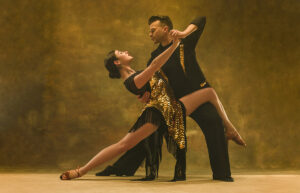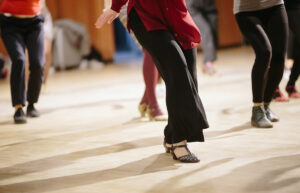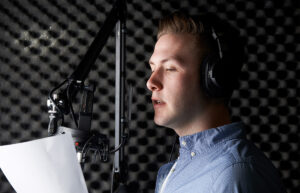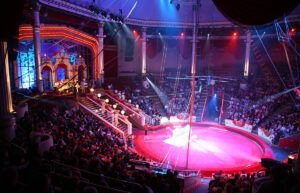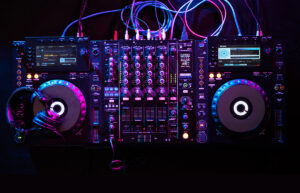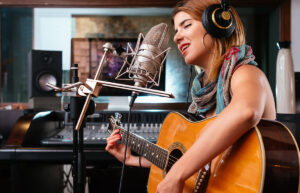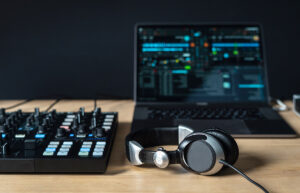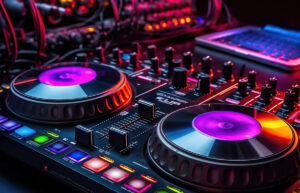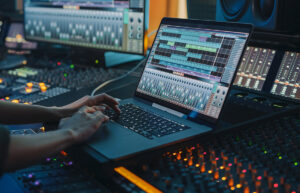A Comprehensive Guide on How to Become a DJ
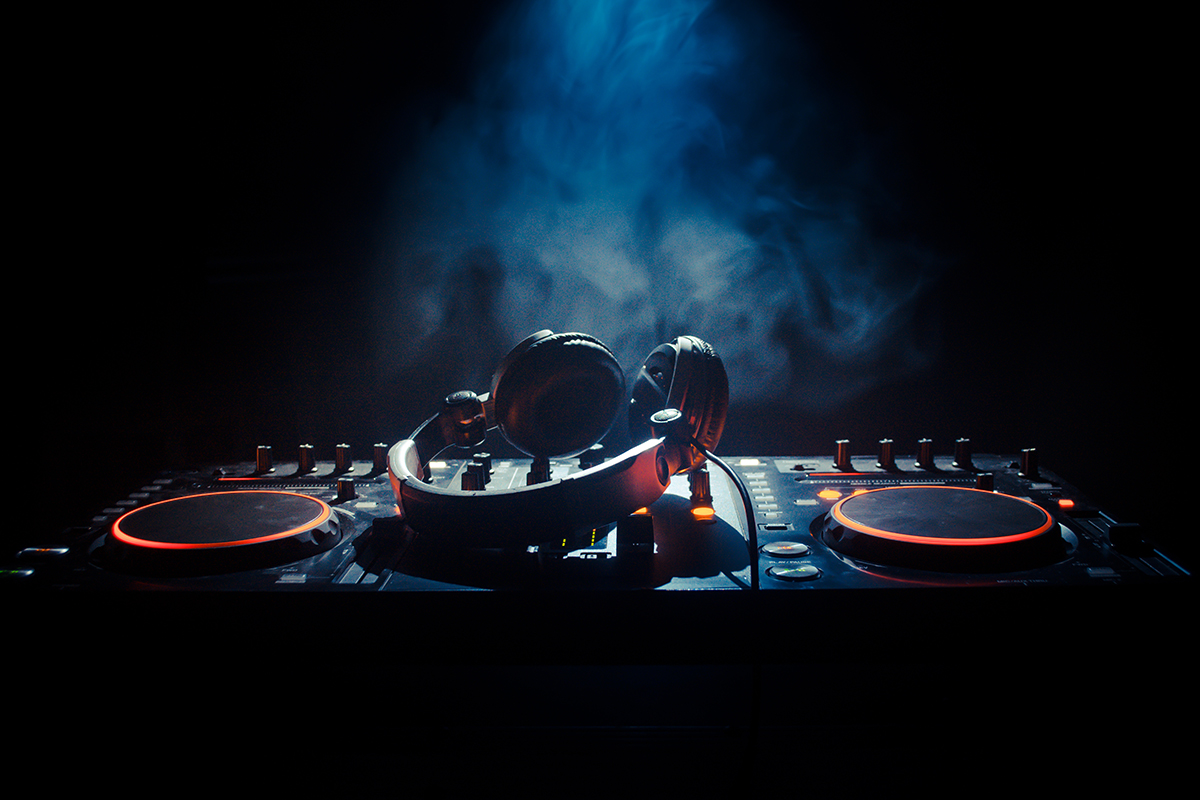
Welcome to an immersive journey into the world of DJing. This comprehensive guide provides a roadmap, illuminating every facet of the DJ’s craft. Whether you’re an aspiring turntablist or a music enthusiast, this guide is your compass, helping you navigate the dynamic realm of DJs and enabling you to become one.
Welcome to TheDemoStop, now join the community!
Connect with artists, fans and producers around the world.
Who is a DJ?
A DJ, an abbreviation for Disc Jockey, is a music enthusiast and artist who passionately selects and plays recorded music for an audience. Using equipment like turntables or digital controllers, they skillfully mix and merge tracks to craft a seamless and captivating musical experience in venues like clubs, parties, and radio stations.
What does a DJ do?

A DJ’s primary responsibility involves choosing and playing music for the audience, using various equipment and skills to blend and switch between songs smoothly. Their expertise ensures an uninterrupted and pleasurable listening experience while also playing a pivotal role in establishing the ambiance and entertaining the crowd.
What are the types of DJs?
There are several types of DJs, each specializing in different aspects of music and performance. Some common types of DJs include:
Club & bar DJs

Club and bar DJs are expert disc jockeys dedicated to creating music experiences for nightclubs and bars. Their role is pivotal in establishing the ambiance and ensuring the audience’s enjoyment. They adeptly choose and blend tracks, frequently employing turntables or digital gear to keep patrons dancing and engaged, resulting in a lively and delightful nightlife atmosphere.
Radio DJs

A Radio DJ serves as the host and presenter on radio stations. Their roles encompass selecting and playing music tracks, engaging with listeners through live or pre-recorded segments, and regularly providing information about songs, artists, and events while maintaining a seamless and enjoyable listening experience. Moreover, they manage advertisements and station promotions and occasionally interview guests on their shows.
Wedding or mobile DJs

Wedding DJs, also called mobile DJs, are experts dedicated to delivering music and entertainment services for weddings and other private events. These skilled DJs excel in customizing their playlists to align with the host preferences and the distinct atmosphere of the event, ensuring guests enjoy a memorable and delightful experience on the dance floor.
Turntablists

Turntablists are DJs who excel in crafting intricate and rhythmic sounds by skillfully manipulating vinyl records using turntables and mixers. They demonstrate remarkable proficiency in techniques like scratching and beat juggling. Turntablists uniquely blend the worlds of DJing and live music, displaying their creativity with vinyl records to deliver dynamic performances.
Technical or specialist DJs

Technical or specialist DJs typically excel in distinct genres, styles, or techniques, differentiating themselves from generalist DJs. These specialists concentrate on mastering the technical intricacies of their chosen style, whether it’s turntablism, scratching, beat juggling, or other specialized methods.
Bedroom DJs

Bedroom DJs are enthusiasts who pursue DJing from the comfort of their bedrooms. They frequently use equipment such as turntables, controllers, or software to mix music, create playlists, and experiment with diverse sounds. Bedroom DJs refine their skills, craft unique mixes, or find joy in DJing as a personal hobby without necessarily seeking it as a professional career.
What Makes a Good DJ?

A good DJ embodies several essential qualities contributing to their success in entertaining audiences. Here are some key factors that make a good DJ:
Passion
Passion for music and DJing is undeniably a cornerstone of becoming a skilled DJ. It drives individuals to continually refine their skills, explore new tracks, and stay updated with industry trends. A passionate DJ cherishes the craft and forges a profound connection with the audience, resulting in memorable experiences.
Motivation and organization
Motivation amplifies one’s dedication to skill improvement, while organization is pivotal for efficiently managing music collections, playlists, and performance schedules. It guarantees well-coordinated and smooth performances.
People and networking skills
Successful DJs excel in building a robust network within the music industry, opening doors to numerous opportunities and collaborations. They possess the ability to connect with fellow artists, event organizers, and industry professionals, propelling their careers to success.
Technical ability
Proficiency in utilizing DJ equipment, encompassing turntables, CDJs, mixers, and controllers, is a must for DJs. They should also be at ease with DJ software and digital music libraries. This technical prowess empowers them to craft seamless and enjoyable musical experiences for their audience.
Welcome to TheDemoStop, now join the community!
Connect with artists, fans and producers around the world.
How to become a DJ

To become a DJ, follow these steps:
1. Decide what kind of DJ you want to be
The first step is to define your DJ Style based on your musical preference and the audience you want to engage. Options include Club DJ, Mobile DJ, Turntablist, or Radio DJ.
2. Buy your DJ equipment
DJ equipment is the core of your setup. Invest in key DJ equipment like a controller, DJ software, speakers, amplifiers, a music library, and a laptop. Ensure your gear suits your chosen style.
3. Budget properly
Budgeting is crucial. Start with core equipment like mixers, headphones, and turntables, which can cost $500-$2000. Invest in music software and computer, around $500-$1000. Initial expenses can range from $1,450 to $4,000, with monthly costs of around $600. Utilize free online resources and tutorials for skill development.
4. Learn from professional DJs
Network with experienced DJs, attend workshops, and seek mentorship to gain valuable insights. Invest in quality equipment, practice consistently, and study various music genres to develop your unique style.
5. Learn about BPM
BPM or Beats Per Minute, is a fundamental concept in DJing. It represents the tempo of a song, indicating how fast or slow it plays. Mastering it ensures smooth transitions between music tracks.
6. Practice
The key to becoming a skilled DJ is consistent practice. Improve your skills in beatmatching, song selection, and mixing. Develop your techniques and style by exploring different music genres. Experiment with different music genres to expand your repertoire.
7. Become a music expert
Invest in quality DJ equipment, learn beat matching and mixing basics, and build a diverse music collection. Promote your talent through live performances, networking, and online presence.
8. Land some gigs
To kickstart your career, start by networking in the local music scene. Approach local venues and events, offering to perform for free or a minimal fee. Establish a strong online presence through social media and platforms like SoundCloud.
9. Show your personality
Showcase your unique personality through your music. Experiment, find your sound, and let your passion shine. Connect with your audience on a personal level.
10. Don’t be fazed
The journey of becoming a DJ is an exciting one that begins with a love for music. Invest in basic DJ equipment, practice consistently, and build your music collection. Seek mentorship and consider courses to enhance your skills.
Building your DJ brand and networking
To establish a thriving DJ brand and network effectively, you’ll need to follow these essential steps:
1. Create a unique DJ name
Picking out an original DJ name is an important initial move. By infusing your interests, style, or a standout characteristic into your name, you can create a name that’s both memorable and engaging. This DJ name can serve as a potent means of connecting with your audience and making a lasting impression.
2. Develop a logo and visual identity
Crafting a distinctive logo and visual identity is crucial in brand development. Your logo should mirror your style and musical persona, employing elements, colors, and typography that resonate with your intended audience. This visual identity transforms into a recognizable emblem, streamlining connections with fans, promoters, and fellow artists.
3. Establish an online presence
A robust online presence is crucial in today’s digital age. Start by building a professional website showcasing your bio, past performances, and a portfolio of your mixes. Use social media platforms like Instagram, Facebook, and Twitter to share your music, engage with your audience, and connect with other DJs and industry professionals.
4. Promote yourself
Self-promotion is key to building your DJ brand and effectively expanding your network. Engage with audiences, collaborate with fellow artists, and actively seek opportunities to perform live to promote yourself.
Welcome to TheDemoStop, now join the community!
Connect with artists, fans and producers around the world.
Equipment required to be a DJ
Becoming a DJ requires essential equipment to create and mix music effectively. Here’s a list of key items:
DJ controller and DJ software

A DJ controller and the right DJ software form the core of the setup. It enables DJs to manipulate and mix music seamlessly.
Headphones

Quality headphones are crucial tools for DJs. They help in cueing tracks and ensure precise mixing during performances.
Speakers

A sound system is vital for live DJ performances, ensuring the audience enjoys the music.
Laptop

A laptop is essential for storing and playing music tracks, providing the DJ with a comprehensive library of songs.
Decks

Decks are essential for DJs, allowing them to control and manipulate records during performances.
DJ Mixer

A DJ mixer blends and transitions between tracks, enabling smooth and harmonious music sets.
A one-gigabyte USB stick

This portable device allows DJs to store their music collection conveniently and is often used for backup during live performances.
Mastering tools

These tools help fine-tune and optimize the sound quality, ensuring that every track is played at its best.
Some basic DJing skills
Basic DJing skills encompass several crucial elements:
Gain control
DJs must skillfully manage track volume to maintain a smooth mix. Balancing track output levels prevents sudden volume spikes that can disrupt the mix’s flow, ensuring a consistent sound throughout the performance.
Phrasing
Phrasing involves understanding music structure in counts of bars and beats. DJs should know when to transition between tracks at musically appropriate moments, ensuring a harmonious mix that flows seamlessly and offers an enjoyable listening experience.
EQ
EQ is the art of adjusting each track’s bass, midrange, and treble. DJs use EQ knobs or sliders to create smoother transitions between songs, allowing for seamless blending and preventing frequency clashes. This skill results in a cleaner and more harmonious mix.
Beatmatching
Beatmatching is a foundational skill for DJs, involving synchronizing one track’s beats per minute (BPM) with the next. This ensures tracks perfectly sync during transitions without noticeable tempo changes. Beatmatching is essential for maintaining a continuous and seamless musical experience.
Tips to become a successful DJ

To embark on the journey to become a successful DJ, one should consider these essential tips:
1. Understand the basics
Building a strong foundation is paramount. Start by gaining proficiency in the fundamentals of DJing, encompassing music theory, equipment mastery, and a diverse understanding of music genres. This knowledge forms the bedrock of your DJing career.
2. Develop your skills
Devotion to practice is essential. Keep honing your DJ skills, including beatmatching, phrasing, and crowd-reading. The more you commit to practice, the more confident and adept you’ll become, a pivotal factor in captivating your audience.
3. Choose the right equipment
Invest in high-quality DJ equipment that aligns with your unique style. Whether it’s turntables, controllers, or CDJs, ensure your gear matches your requirements and preferences. Having the right tools at your disposal is essential for delivering exceptional performances.
4. Create a unique sound
Develop your signature sound. This might entail focusing on a particular music genre, era, or a fusion of various styles. A unique sound will distinguish you in the competitive DJ industry.
5. Network and promote
Building your brand and connecting with industry peers is crucial. Attend events, collaborate with fellow DJs and producers, and utilize social media to promote your work. Networking is the key to raising your profile and gaining recognition.
6. Gain experience
Start with smaller gigs and gradually work your way up. The more experience you gain, the more comfortable and confident you’ll become. Through these experiences, you’ll refine your skills and develop a deeper understanding of your audience’s preferences.
Welcome to TheDemoStop, now join the community!
Connect with artists, fans and producers around the world.
Conclusion
This extensive guide on becoming a DJ has provided insights into various facets of the DJing realm. Here are the key points to remember:
- Understanding the DJ’s Role: A DJ is a music enthusiast and artist who curates and plays recorded music for audiences. They use various equipment and skills to create musical experiences.
- Types of DJs: There are several types of DJs, including Club and bar DJs, Radio DJs, Wedding or Mobile DJs, Technical/Specialist DJs, and Bedroom DJs, each specializing in different aspects of music and performance.
- Qualities of a Good DJ: Good DJs possess passion, motivation, organization, people skills, technical proficiency, and an understanding of BPM.
- Becoming a DJ: To embark on a DJing journey, you must decide what type of DJ you want to be, buy the right equipment, budget appropriately, learn from professionals, understand BPM, practice, and create a unique sound. Networking and gaining experience are vital steps toward success.
- Building Your DJ Brand: Developing a unique DJ name, logo, visual identity, and online presence is crucial. Promoting yourself and networking within the music industry are key to building your brand.
- Essential DJ Equipment: Key equipment includes a DJ controller and software, headphones, speakers, a laptop, decks, a DJ mixer, USB sticks, and mastering tools.
- Basic DJing Skills: Mastering skills like gain control, phrasing, EQ, and beatmatching are essential for delivering seamless mixes.
- Tips for Success: To become a successful DJ, understand the basics, practice consistently, choose the right equipment, develop a unique sound, network and promote yourself, and gain valuable experience.
FAQs
What does DJ stand for?
DJ stands for “Disc Jockey”
Who is a DJ?
A DJ is a music enthusiast and artist responsible for curating and playing recorded music for audiences in various settings like clubs, weddings, events, and radio stations. Their primary role is to select and transition between songs, ensuring a continuous and enjoyable listening experience while keeping the audience entertained.
What does a DJ do?
A DJ uses various equipment and skills to choose and smoothly transition between songs, creating a continuous and enjoyable listening experience. DJs play a vital role in setting the atmosphere and entertaining the crowd at different events.
What are the types of DJs?
Different types of DJs specialize in various aspects of music and performances, including Club and bar DJs, Radio DJs, Wedding or Mobile DJs, Turntablists, Technical/Specialist DJs, and Bedroom DJs.
What makes a good DJ?
A good DJ possesses a combination of skills, qualities, and characteristics that contribute to their success. These include a passion for music, motivation and organization, people and networking skills, and technical ability.
How to become a DJ?
To become a DJ, one can start by selecting a DJ path based on their musical preferences. Acquiring essential DJ equipment, budgeting wisely, learning from experienced DJs, understanding BPM, consistent practice, skill development, expanding music knowledge, networking, landing gigs, and showcasing a unique style are essential to becoming a successful DJ.
How to build a DJ brand and networking?
To establish a DJ brand and network, create a unique DJ name and develop a distinctive logo and visual identity. Utilize social media and professional websites to showcase your work and interact with audiences. Promotion, collaboration with other artists, and active participation in the music industry are vital to expanding your network and presence.
What is the equipment required to be a DJ?
Essential DJ equipment includes a DJ controller and DJ software, headphones for precise cueing, speakers, a laptop for music storage and playback, decks for vinyl DJs, a DJ mixer for track mixing, one gigabyte USB stick for backup, and mastering tools for audio enhancements.
What are some basic DJing skills?
Basic DJing skills include gain control, phrasing, EQ, and beatmatching. Gain control is about managing volume levels for a seamless mix. Phrasing involves recognizing when to transition between tracks. EQ helps create smooth transitions and Beatmatching ensures tracks play in sync for seamless transitions between songs.
How can we become a successful DJ?
To become a successful DJ, it’s crucial to master the basics, continually develop skills through practice, choose the right equipment, create a unique sound, build a network, and gain valuable experience through performances.








